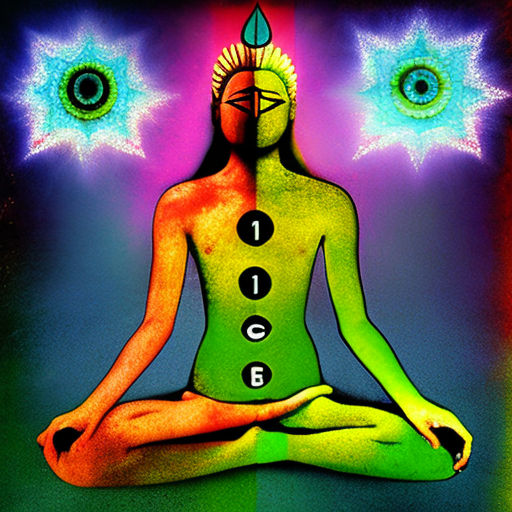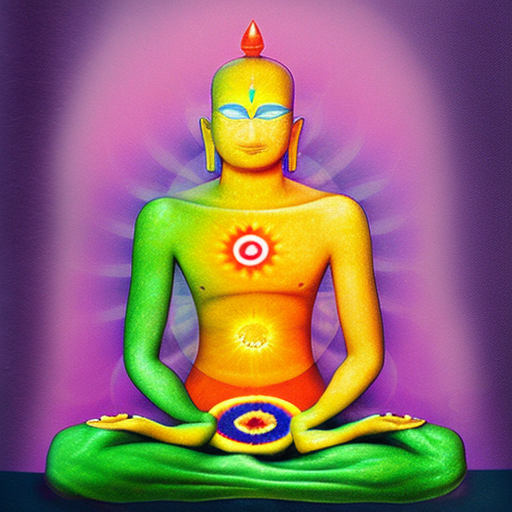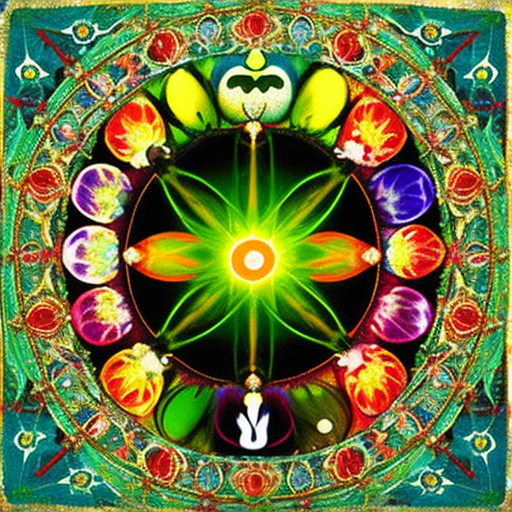?
Chakra meditation is a popular practice that has gained significant attention in recent years. It is believed to promote overall well-being by aligning and balancing the body’s energy centers, known as chakras. While many individuals have reported positive benefits from engaging in chakra meditation, some concerns and misconceptions have arisen regarding its potential dangers.
Understanding Chakras
Chakras are believed to be spinning wheels or vortexes of energy located along the central axis of the body. There are seven main chakras, each associated with different physical, emotional, and spiritual aspects. They are commonly represented as different colors and can be visualized during meditation.

Image source: Unsplash
The Benefits of Chakra Meditation
Chakra meditation aims to activate, cleanse, and balance the chakras. Proponents of this form of meditation suggest that it can help individuals achieve a state of inner peace, enhance self-awareness, improve focus, boost energy levels, and facilitate emotional healing.
Addressing Safety Concerns
While chakra meditation is generally considered safe for most individuals, it is important to approach any new meditation practice with caution and seek guidance from experienced practitioners or trained teachers. This is particularly relevant for individuals with pre-existing mental health conditions, as meditation can sometimes bring up unresolved issues or emotions.
Moreover, excessively focusing on a specific chakra or performing chakra meditation without proper understanding can lead to imbalances. It is crucial to maintain a holistic approach and ensure that all chakras are harmonized, rather than solely focusing on a single energy center.
Practicing Chakra Meditation Safely
To reap the potential benefits of chakra meditation while minimizing risks, consider the following tips:
- Start with guided meditation: Begin your chakra meditation practice with the guidance of a well-known teacher or an audio recording specifically designed for beginners.
- Learn proper techniques: Gain knowledge about the different chakras, their characteristics, and the appropriate techniques to activate and balance them.
- Do not force the process: Avoid overexertion or attempting to achieve immediate results. Chakra meditation is a gradual journey that requires patience and perseverance.
- Listen to your body: Pay attention to any discomfort or signs of imbalance during meditation. Consult a healthcare professional if you experience persistent or severe symptoms.
- Maintain a well-rounded practice: Incorporate other mindfulness or relaxation techniques alongside chakra meditation to promote overall well-being.
Conclusion
Chakra meditation, when approached with an understanding of its principles and practiced safely, can be a valuable tool for personal growth, relaxation, and self-awareness. Like any form of meditation or therapy, it is essential to practice it responsibly and seek professional guidance if needed. With the right approach, chakra meditation can be a transformative practice that brings about positive changes in one’s life.




It’s always important to go gently and be mindful in any practice. #meditationsafety #chakrameditation
JeanaLopez: Yes! It’s important to practice meditation safely to avoid any potential dangers. #meditationtips #chakrameditation
Agreeing with the previous advice, it’s important to research the potential risks of chakra meditation before beginning and make sure to practice responsibly to ensure a safe and beneficial experience. #meditationsafety #chakrameditation
Absolutely! Chakra meditation can be a powerful practice, but like any activity, it has the potential for both positive and negative effects. It’s crucial to approach it with caution and respect, especially if you’re new to meditation or energy work. While chakra meditation can bring about numerous benefits, such as increased self-awareness and healing, it’s essential to be aware of potential risks.
One potential danger is that chakra meditation can create an imbalance in your energy system if not done correctly. When focusing on specific chakras, it’s crucial not to overstimulate or under-activate them, as this can lead to physical, emotional, or mental distress. It’s crucial to learn proper techniques, possibly through a knowledgeable teacher or guide, and start with a balanced approach.
Additionally, some individuals may experience intense emotional releases or even spiritual crises during chakra meditation. Opening up and working with these energy centers can uncover buried emotions and thoughts, which can be overwhelming if you’re unprepared or lack proper support. It’s crucial to approach these experiences with self-compassion and seek guidance if needed.
Moreover, it’s important to note that chakra meditation may not be suitable for everyone. Individuals with certain mental health conditions or trauma histories may find this practice triggering, potentially exacerbating their symptoms. It’s essential to consult with a healthcare professional if you have any concerns or pre-existing conditions before delving into chakra meditation.
In conclusion, chakra meditation has the potential to be transformative and healing, but it’s crucial to approach it with caution. By researching, seeking guidance, and practicing responsibly, you can mitigate potential risks and reap the benefits of this powerful practice. Remember, meditation should always be approached with mindfulness, self-care, and personal responsibility.
Ly. Each chakra has its own unique qualities and functions, and when they are in balance, they support overall well-being. However, if one or more chakras become overactivated or underactivated, it can lead to physical, emotional, or mental imbalances. For example, an overactive solar plexus chakra may result in excessive ego, control issues, or manipulative behaviors, while an underactive throat chakra can lead to difficulty expressing oneself or fear of speaking up. It’s important to approach chakra meditation with proper guidance and knowledge to prevent such imbalances.
Another potential danger of chakra meditation is the release of repressed emotions or trauma. As you delve into the depths of your energy system, unresolved issues may surface, sometimes unexpectedly. This can be emotionally challenging and overwhelming, especially if you’re not prepared or supported by a skilled practitioner. It’s essential to create a safe and nurturing space for yourself and seek professional help if needed when dealing with intense emotions or traumatic memories.
Lastly, chakra meditation can also be physically straining if not done in moderation or with proper technique. Intense or prolonged focus on a specific area of the body, combined with incorrect posture or breathing techniques, can lead to muscle strain, fatigue, or even injury. It’s crucial to listen to your body’s signals, take breaks when needed, and learn from experienced practitioners to ensure a safe and effective practice.
In conclusion, while chakra meditation can be a transformative and beneficial practice, it’s important to approach it mindfully and responsibly. Educate yourself, seek guidance if needed, and listen to your body and emotions throughout your meditation journey. By doing so, you can reap the numerous benefits of chakra meditation while minimizing any potential risks.
En you focus too much on one chakra without balancing the others, it can lead to an imbalance in your overall well-being. For example, if you excessively activate your crown chakra while neglecting your root chakra, you may feel disconnected from reality or struggle with grounding yourself. It’s important to approach chakra meditation with a holistic mindset, ensuring that all your chakras are nurtured and balanced.
Another potential danger is relying solely on chakra meditation to address deep psychological or emotional issues. While chakra meditation can be a valuable tool for self-exploration and healing, it should not replace professional help when dealing with serious mental health concerns. It’s crucial to seek the guidance of a trained therapist or counselor who can provide the necessary support and expertise to navigate these complex issues.
Additionally, chakra meditation can be overwhelming or triggering for individuals who have experienced traumatic events or have underlying psychological conditions. This practice can bring up intense emotions or memories that may require a skilled practitioner or therapist to navigate safely. It’s essential to approach chakra meditation with self-compassion and know when it’s necessary to seek professional support.
In conclusion, chakra meditation can be a potent practice for spiritual growth and healing, but it’s vital to approach it with caution and self-awareness. Practice with moderation, seek expert guidance when needed, and be mindful of your own limitations. By doing so, you can harness the transformative power of chakra meditation while minimizing any potential risks to your well-being.
Hen practicing chakra meditation, it’s important to be mindful of the energy flow throughout your entire body. If you focus too much on one chakra and neglect the others, it can lead to an imbalance in your overall well-being. Each chakra has its own unique qualities and functions, and when they are in balance, they support your overall physical, emotional, and mental health.
Another potential danger of chakra meditation is its ability to bring up repressed emotions or trauma. As you delve into your energy system during meditation, unresolved issues may surface. This can be emotionally challenging and overwhelming, particularly if you’re not prepared or supported by a skilled practitioner. It’s crucial to create a safe and nurturing space for yourself and seek professional help if needed when dealing with intense emotions or traumatic memories.
Furthermore, when practicing chakra meditation, it’s important to be aware of your own limitations. For individuals who have experienced traumatic events or have underlying psychological conditions, chakra meditation can be overwhelming or triggering. It’s essential to approach this practice with self-compassion and know when it’s necessary to seek professional support.
In conclusion, chakra meditation can be a powerful tool for spiritual growth and healing, but it’s crucial to approach it with caution and self-awareness. Practice with moderation, seek expert guidance when needed, and be mindful of your own boundaries. By doing so, you can harness the transformative power of chakra meditation while minimizing any potential risks to your well-being.
Or if you focus too much on one chakra and neglect the others. This can lead to physical, emotional, and mental imbalances. For example, if you excessively activate your crown chakra while neglecting your root chakra, you may feel disconnected from reality or struggle with grounding yourself. It’s important to approach chakra meditation with a holistic mindset, ensuring that all your chakras are nurtured and balanced.
Another potential danger is relying solely on chakra meditation to address deep psychological or emotional issues. While chakra meditation can be a valuable tool for self-exploration and healing, it should not replace professional help when dealing with serious mental health concerns. It’s crucial to seek the guidance of a trained therapist or counselor who can provide the necessary support and expertise to navigate these complex issues.
Additionally, chakra meditation can be overwhelming or triggering for individuals who have experienced traumatic events or have underlying psychological conditions. This practice can bring up intense emotions or memories that may require a skilled practitioner or therapist to navigate safely. It’s essential to approach chakra meditation with self-compassion and know when it’s necessary to seek professional support.
In conclusion, chakra meditation can be a potent practice for spiritual growth and healing, but it’s vital to approach it with caution and self-awareness. Practice with moderation, seek expert guidance when needed, and be mindful of your own limitations. By doing so, you can harness the transformative power of chakra meditation while minimizing any potential risks to your well-being.